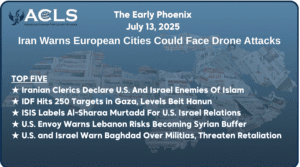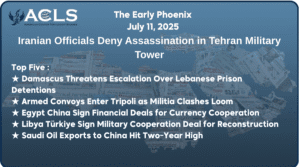February 16, 2021 was a dark day for Yemen. On that day, the new Biden administration, after just three weeks in office, decided to remove the Houthi militias from the U.S. list of foreign terrorist organizations. In taking this misguided step, the U.S. administration explained that delisting the Houthis was essential for allowing better humanitarian access for Yemenis. But the actual consequences of Biden’s decision have been a disaster for Yemenis. The Houthis took Washington’s decision as a green light to greatly expand their campaign of murder not just against any Yemenis who dare to oppose them, but also against neighboring countries.
Many Yemenis were surprised by the haste with which the Biden administration removed the Houthis from the FTO list, just days after the administration of Donald Trump had added the Houthis to it. Was it because the Houthis were somehow former trusted agents of the United States, Yemenis wondered? Or perhaps that the new U.S. administration somehow saw an interest in letting the Houthis continue their campaign of aggressively tampering with the entire surrounding region? Yemenis universally considered Biden’s explanation of a humanitarian imperative implausible, since any Yemeni on any street knows the Houthis have committed the most severe crimes and horrible violations against humanity. What possible humanitarian interest could be served in re-legitimizing such a group? Yemenis wondered.
It is not just Yemenis that view the Houthis in this way. The expert reports of the UN Security Council have documented the Houthis’ systematic crimes against children: abducting children from their homes and conscripting them to become Houthi soldiers, or raping children, both in training camps and on the fronts of the war. The Houthis have also deprived many thousands of Yemeni children of education, not just by taking them away to fight on the war front, but also by degrading the operation of more than three thousand schools. They have reduced teachers’ salaries, shifted free education into a private collection sector, and raised registration fees in public schools to tens of times their historical level.
The Houthis have a similar record of crimes against women. In the capital of Sana’a and in the other areas they control, the Houthis systematically arrest women under the flimsiest of charges so as to torture and rape them. Often, the Houthis film the rapes so they can use the threat of scandal to blackmail their victims or force them to become informants or militia recruits.
If the Biden administration’s main goal in delisting the Houthis was to enable international coordination with the Houthis to deliver more aid and relieve Yemen’s humanitarian crisis, then Washington should be told that that has not happened at all. On the ground in the real Yemen, in the real world, the Houthi militias have diverted all humanitarian assistance, starting with food and medicine, into the hands of their own militias. International aid has consequently become a resource the Houthis have used for waging war and flowing wealth into their military commanders’ pockets. The millions of Yemenis who have been deprived of international assistance are still deprived of it. Moreover, the Houthis have used food and medicine baskets as a sectarian tool, announcing that they would share their bounty only with those who join the Houthi war camps.
If the Biden administration’s secondary goal was to make a goodwill gesture that might lead the Houthis to stop their attacks against Yemen’s neighbors and cooperate with negotiations to end the war, that failed completely as well. After receiving the U.S. gift of their terror delisting, the Houthis did the opposite. They ramped up their military actions, intensified their expansionist war within Yemen, carried out terrorist acts, disrupted the political transition, and rejected all peace options offered to them. They have targeted oil facilities in Saudi Arabia, vital facilities in the United Arab Emirates, international shipping, and, finally, oil and gas facilities in Yemen.
They have done all of this while claiming to other Yemenis that the U.S. administration’s delisting decision shows that Washington somehow welcomes this Houthi aggression. The Houthis have even asserted that Washington’s stance shows that the United States somehow considers the Houthis a partner with the international community in the war on terrorism, even though a simple review of terrorism statistics—not to mention Houthi behavior—shows that the Houthis in their terrorist activities are no different from ISIS or Al Qaeda, two groups that the entire world is fighting against.
The Yemeni government has watched in dismay as the United States relieved pressure from the Houthi militias even as those militias have intensified their warfare. The Yemeni government has made hundreds of concessions and implemented all the conditions stipulated by the United Nations to revive the peace process and stop the war in Yemen. The Houthis, unsurprisingly, have read those concessions as weakness and an invitation to practice more bullying. As a result, they have rejected all domestic and international calls for peace, because they have calculated that the international community lacks the tools and the will to pressure them.
For Yemenis, President Biden’s decision to prioritize the Yemen file in the early days of his administration could have been an opportunity to bring Yemenis’ suffering to an end. But it is clear now the U.S. decision to relieve pressure on the Houthis and remove them from the terror list was a huge mistake. Returning the Houthi militias to the foreign terrorist organization list should be Washington’s first natural step in bringing peace to Yemen, securing international shipping lines, and deterring attacks against regional energy facilities, all of which would serve the global interest as well as restoring hope to millions of Yemenis. If Washington continues to send the wrong signal concerning the Houthis’ terrorism and regional aggression, we will continue to see exactly what we have seen for seven years: the continued ascendancy of a militant group that rejects coexistence, considers war as its opportunity to grow, considers the destruction of others as a victory, and considers tampering with the security of neighboring countries as heroic.



